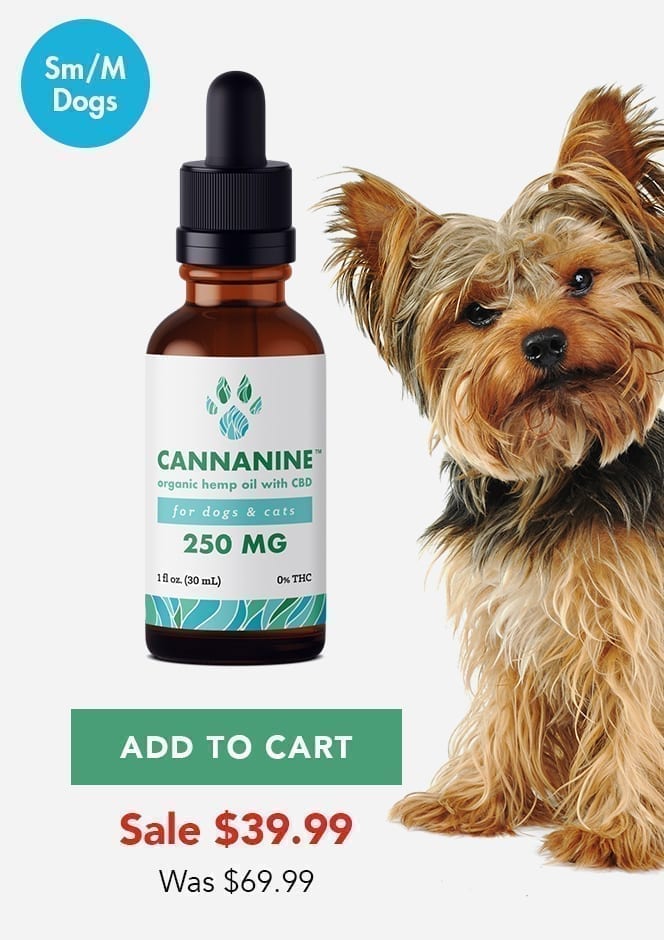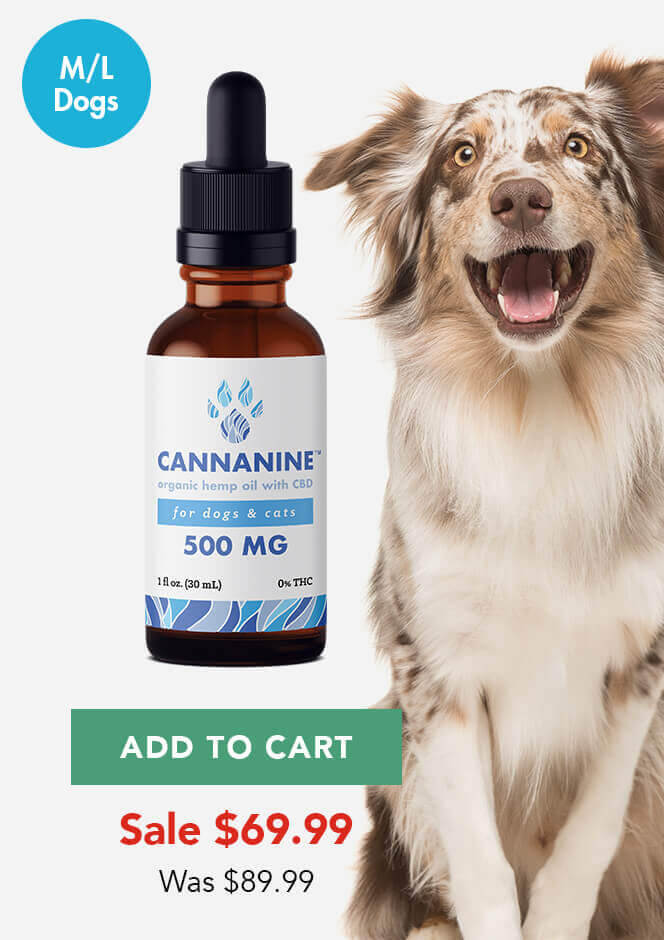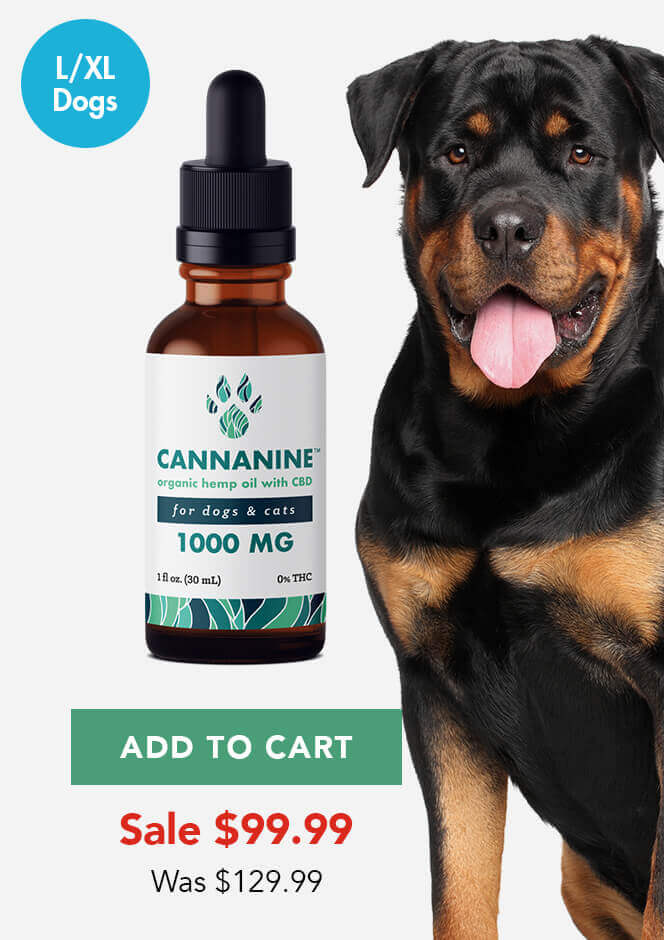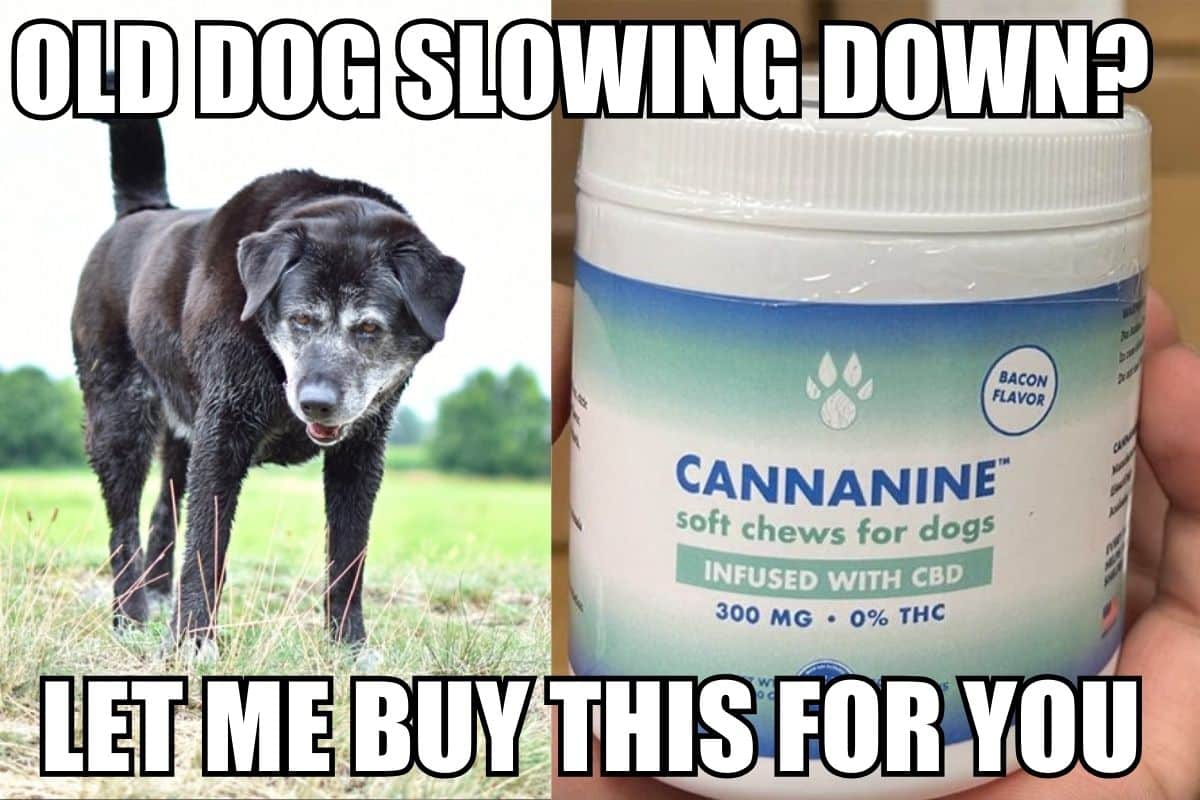
What Can I Give My Dog For Stress?
When you leave for work your dog whines and paces. The neighbors report incessant barking and scratching at the door while you are away. Every time you ride in the car, your pup shakes, drools, and cowers. If any of these scenarios sound familiar, you may wonder, “What can I give my dog for stress?”
There are several options including pharmaceuticals, holistic remedies, and natural products like CBD oil from hemp. Here we will discuss the causes of stress in dogs and how to choose the best treatment for your pup’s individual needs.

What Causes Stress In Dogs?
Our pet dogs no longer have to worry about foraging for food or avoiding predators, but domestication has come with a new set of stressors. Thunderstorms, strangers, car rides, visits to the vet, and separation from their humans are all common catalysts for stress in dogs.
Specific phobias such as those related to noise may stem from previous trauma, but stress can strike any dog at any time. Studies show that while stress affects dogs of all kinds, age, breed, size, and sex can all play a role.
Separation Stress
With so many working pet parents, separation stress is a common problem. It may be caused by over-attachment between dog and owner, or by a lack of attention. Bouts of temporary or worsening separation stress may occur following boarding, the death of a loved one, loss of a pet, or moving to a new home.
Finding a balance of proper exercise, mental stimulation, and emotional support is key to producing a confident pup.

Fear-Induced Stress
Fear is a normal response. However, when dogs develop irrational fears of harmless people, places or things, it can become a big problem. This type of stress is common in dogs that lack socialization skills and those that have experienced past trauma.
For example, loud noises like thunder, fireworks, and slamming doors may terrify your dog ever since he was startled by a backfiring car. Or, the dog you rescued from the shelter may fear bicycles, skateboards, and wheelchairs simply because he was never exposed to them.
The same holds true for dogs that do not receive socialization with lots of people and pets as puppies. Without proper exposure and socialization during their critical development phase, they often develop irrational fear-related stressors.
Age-Related Stress
Puppies are usually carefree, with most cases of stress in dogs developing around 12 to 36 months of age. While these dogs may battle stress for the rest of their lives, other dogs do not become stressed until their senior years.
Older dogs face stress when they lose mobility and their senses decline. Seniors that once navigated their surroundings with ease face impaired vision and hearing, sore joints, and cognitive issues similar to dementia in humans. Click here for tips on how to make life easier for your senior dog.
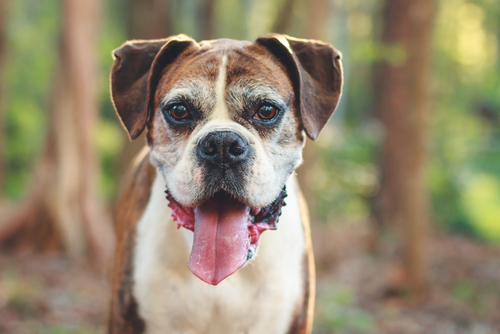
How Breed Affects Canine Stress
One study on stress in various dog breeds found that small and toy breeds are more stress than larger breeds. The researchers measured the dogs’ reactions to five stressful scenarios: meeting unfamiliar people, meeting other dogs, touch sensitivity, loud noises, and separation from their humans.
The following breeds had high reactivity scores in all five categories:
- Chihuahuas
- Dachshunds
- Miniature Dachshunds
- Maltese
- Toy Poodles
- Yorkshire Terriers
Beagles and Shih-tzus were close behind with high scores in four out of five categories. Brachycephalic (short-muzzled) breeds such as Bulldogs and Pugs had lower scores, as did many larger breeds.
Stress & Dog Size
Smaller dogs tend to be more fearful, excitable, and prone to aggression. This may be an evolutionary survival instinct since they are more vulnerable to predators, but it may also have a genetic link. Larger dogs are less likely to be chosen for breeding if they display aggressive tendencies. Smaller dogs, however, get away with behavioral issues as we do not see them as threatening.

Gender May Play A Role In Canine Stress
Just like in humans, female dogs seem to have higher rates of stress, or at least show more of the physical signs. A study showing the connection between stress and premature muzzle graying found that female dogs are significantly more likely than male dogs to go gray by age four. However, another study found that separation stress is more common in male dogs.
Dog Stress Symptoms
Some dogs hide during stressful situations while others seek out their humans, whining and pawing at them for support. Still others act out, tearing up furniture or scratching the paint off the door.
Below are the most common signs and symptoms that a dog is suffering from stress:
- Attention Seeking
- Hiding
- Shaking
- Panting
- Drooling
- Pacing
- Destructive Behaviors
- House Soiling
- Attempting to Escape
- Self Harm
- Stress Body Language: Cowering, Ears Flat, Tail Between Legs
- Excessive Vocalization: Barking, Whining, Howling
Note: Stress symptoms can be quite severe. If your pup has become self-destructive or poses a risk to you, your family, or any other pets in the home, seek professional help immediately.

What Can I Give My Dog For Stress?
Wondering what medications and holistic products are safe to give to an stress dog?
Pharmaceuticals
There are several classes of dog stress medications, many of which are human pharmaceuticals. While these medications are effective, they are also powerful, and must be given with caution. Your vet will choose the best medication to suit your dog’s specific stress triggers and symptoms.
For example, some dog stress medications are great for separation stress and obsessive behaviors, while others are better suited for stress during storms and fireworks. Like all drugs, the pharmaceuticals for stress dogs come with potential side effects and may not be safe for all pups.
Benadryl For Stressed Dogs
While Benadryl is an antihistamine, not a stress medication, many dog parents inquire about its use. It is a convenient option due to its low cost, availability over-the-counter, and known sedative effects. However, before you give Benadryl to your dog for stress, speak to your vet. He or she can give you a proper dosage and other treatment options based on your dog’s symptoms.

Holistic Options
If your dog’s stress is mild, or you prefer to use more natural remedies, consider herbal supplements or aromatherapy. Echinacea, Chamomile, St. John’s Wort, and Valerian Root are holistic herbs that may help reduce stress and excitability.
Certain flower essences such as Rock Rose, Star of Bethlehem, and Cherry Plum may help calm stressed dogs and restore emotional balance in stressful situations. Some pet parents also use essential oils like lavender and marjoram to offer soothing aromatherapy to stressed dogs.
CBD Oil From Hemp
Cannabidiol – or CBD – is a natural extract of the hemp plant. This extraordinary compound is gaining traction as a safe, effective option for stressed dogs and humans alike.
CBD oil works by interacting with the cannabinoid receptors throughout the central nervous systems of mammals. When given to stressed dogs, CBD binds to these receptors, stimulating their natural ability to create serotonin. This helps stabilize mood and bring the body and mind back into balance.
CBD oil can be given regularly to help with the continuing symptoms of separation stress and generalized stress. It can also be given on an as-needed basis 30 – 60 minutes before a stressful event such as a thunderstorm or trip to the vet.
Which CBD Oil Is Best?
CBD is booming in popularity as a treatment option for several ailments in people and in pets. With so many products saturating the market, it’s difficult to determine which is safest and most effective for your dog. Cannanine Organic Full Spectrum Hemp Oil™ is made specifically for dogs and cats so you never have to worry about the harmful side effects of products containing THC.
THC – or tetrahydrocannabinol – is a compound from the same family as CBD. While hemp has small amounts of THC, it is abundantly found in marijuana, giving weed its signature “high.” The law states that any CBD oil with less than 0.3% THC can be labeled as safe for pets. However, Cannanine puts in the extra effort to remove every trace of THC from our products, ensuring your dog’s health and safety.
We even have the Certificate of Analysis to prove it!
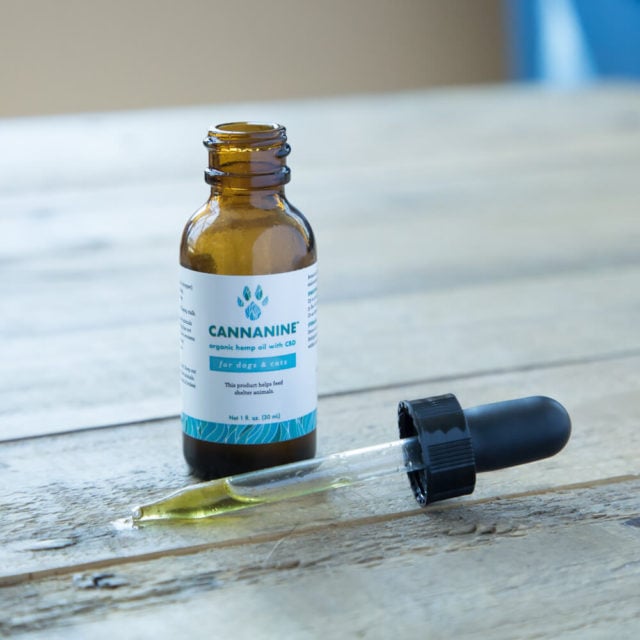
Cannanine is made from organically grown Colorado hemp and is free of heavy metals, bacteria, and other harmful toxins. It is legal in all 50 states and will never make your dog “high.”
While CBD oil provides the fastest relief from stress symptoms, picky pups may prefer our bacon flavor Soft Chews or our bacon and cheese flavor All-Natural Baked Dog Treats.
Stress can seriously affect mental and physical health. If your dog battles stress, all-natural CBD oil from hemp may reduce or even eliminate the need for pharmaceuticals.
Choose The Right Relief For Your Pup
100% Money Back Guarantee
PLUS Up To 40% Off When You Shop Today







Popular Articles On CBD For Dogs Stress
Popular Articles On CBD For Dogs
- How CBD Oil Can Help Reduce Your Dog’s Excessive Barking
- How Long Before CBD Oil Starts Working for My Dog?
- How Often Can I Give My Dog CBD Oil?
- How Long Do The Effects Of CBD Oil Last For Dogs?
- What Are Possible CBD Side Effects For Dogs?
- Top 5 Ways To Administer CBD Oil To A Dog
- How CBD Oil Can Increase Your Dog’s Appetite And Prevent Nausea & Vomiting
- How CBD Oil May Help Your Dog Sleep Better
- Can CBD Oil Help Your Dog’s Stress and Nausea In The Car?
- 4 Reasons Senior Dog Owners Are Flocking to CBD Oil
- CBD Oil and Gabapentin Dogs
- CBD Oil Tinctures vs. CBD Treats for Dogs: Which Is Better?
These statements have not been evaluated by the Food and Drug Administration. This product is not intended to diagnose, treat, cure, or prevent any disease. The information on this website is not intended to replace a one-on-one relationship with a qualified healthcare professional.











